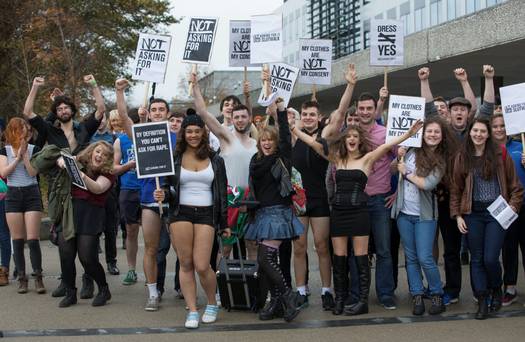I wasn’t shocked. I wasn’t even that upset. I simply felt numb, and I still do. There’s a point in any battle worth fighting when even the most valiant feel they cannot go on. When women’s bodies are yet again disrespected, humiliated, shamed, and objectified, the question must be asked: will the struggle ever prove its worth?
Most of us have seen the news. The news which reported that 200 male UCD students shared stories and nude photos of girls through a Facebook chat group which bears resemblance to an online revenge porn ring. The students are yet to be named and shamed. However, the College Tribune quoted one boy, claiming involvement to groups of this ilk, who stated: “I personally have only sent 3 photos and a story or two!” How noble.
While victims and perpetrators alike remain anonymous, we can hope that soon those involved will be brought to some kind of justice. If people want to see cute nude girls, they should look at those who have consented to have their pictures shared, not those exposed unfairly. But for now we must ask ourselves why this behaviour is still thought of as acceptable? What does this signify for the battle against lad culture and rape culture, which has affected universities in Ireland, the UK, and the US in recent years.
Perhaps their aim was to humiliate women just because they could, because they got some kind of a sick kick out it, because they felt that women owe them something.
I first wondered why these students did this. Perhaps their aim was to humiliate women just because they could, because they got some kind of a sick kick out it, because they felt that women owe them something. Perhaps it is simply because their fragile masculinity wanes as modern society strives toward greater gender equality. Or maybe they’re just a bunch of arseholes, gormlessly followed by cowards who don’t dare to challenge the status quo. Your guess is a good as mine.
But what can we do to change this for the better in the future? The obvious response is adequate punishment. But I want prevention – I don’t just want a cure. Louise O’Neill, the admirable author and women’s rights activist, pointed out that perhaps we can’t expect some men to learn to think differently, and that real laws must be put in place to shame the perpetrators of these acts. Don’t get me wrong: revenge porn laws are important, and we need there to be real, tangible repercussions for those that participate in these dehumanising offences. But really, how can groups like this still exist at one of the top institutions in Ireland? At a university where the Students’ Union President – though himself formerly accused of participating in a group called “Girls I’d Shift if I were Tipsy”– made it one of his mandates to suck the poisonous lad culture from the very walls of UCD campus?
But when incidents like this happen so close to home, I start looking at the very men I call my friends, wondering whether they could have been a part of it.
So what does this mean for Trinity? In many regards, we are making progress to combat certain manifestations of rape culture on campus. The introduction of potential “mandatory” consent classes for incoming Trinity Hall residents gives me hope. But when incidents like this happen so close to home, I start looking at the very men I call my friends, wondering whether they could have been a part of it. Maybe that’s ridiculous – I like to think I have good judgement of character. But though one’s good character may stop one being actively involved in horrendous incidents like this, without affirmative action against people like this, without criticising it publicly and challenging comments which foster negative cultures every day, you legitimise these actions. You become just as bad. Though it is those who commit these abuses that are the problem, it’s also the general complicity which truly kills progress.
This kind of behaviour is not all men. People of all genders and sexualities are capable of treating each other reprehensibly. But it is a lot of men. It’s 200 boys that could so easily be people we’ve walked past on Grafton street, queued up for coffee with in Lemon, or brushed past on a night out. People who, if we didn’t know better, we would say were just like us.
When will we all, every single one of us, understand the gravity of the situation at hand? Misogyny isn’t funny. But how many more women shamed and objectified will it take before everyone stops laughing?







